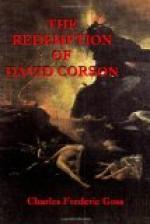CHAPTER XIV.
TURNED TEMPTER
“All men have
their price.”
—Walpole.
The plan which David had chosen to compel Pepeeta to abandon her husband was not a new one. For its execution he had already made a partial preparation in an engagement to meet the justice of the peace who had performed her marriage ceremony. The engagement was conditioned upon his failure to persuade the gypsy to accompany him of her own free will.
Immediately after supper he took his way to the place appointed for the meeting. This civil officer had been a companion of the quack’s for many years. His natural capacity, which was of the highest order, had secured him one place of honor after another; but he had lost them through the practice of many vices, and had at last sunk to that depth of degradation in which he was willing to barter his honor for almost any price.
The place at which he had agreed to meet David was a low saloon in one of the most disreputable parts of the city, and to this spot the infatuated youth made his way. Now that he was alone with his thoughts, he could not contemplate his purpose without a feeling of dread, and yet he did not pause nor seriously consider its abandonment. His movements, as he elbowed his way among the outcasts who infested this degraded region, were those of a man totally oblivious to his surroundings.
“Curse him,” he muttered in an undertone, and did not know that he had spoken.
To talk to one’s self is so often a premonitory symptom of either insanity or crime, that a policeman standing on the corner eyed him closely and followed him down the street.
Having reached the door of the saloon, David cast a glance about him, as if ashamed of being observed, and entered. It was a fitting place to hatch an evil deed. The floor was covered with filthy sawdust; the air was rank with the fumes of sour beer and adulterated whisky; the lamps were not yet lighted, and his eyes blinked as he entered the dirty dusk of the interior. Against the wall were rude shelves strewn with bottles, decanters, jugs and glasses. The landlord was leaning against the inside of the bar glaring about him like an octopus. The habitues of the place, looking more like scarecrows than men, stood opposite him with their blear eyes uplifted in ecstasy, draining into their insatiable throats the last precious drops from their upturned glasses.
At a table four human shapes which seemed to be operated by some kind of clumsy mechanical motors rather than animated by sentient spirits were playing a game of chance and slapping the greasy cards down upon the table to the accompaniment of coarse laughter and hideous profanity.
The Quaker, who was not yet thoroughly enough corrupted to witness this spectacle without horror, hurried through the room like a man who has suddenly found himself in a pest-house. The door which he pushed open admitted him to a parlor scarcely less dirty and disgusting that the saloon itself, at the opposite end of which, wreathed in a cloud of tobacco smoke, he beheld the object of his search.




